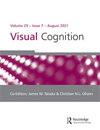这是一个真正的三维形状吗?PSVT:R中结构有效性和项目难度的调查
IF 1.4
4区 心理学
Q3 PSYCHOLOGY, EXPERIMENTAL
引用次数: 0
摘要
普渡空间可视化测验(Purdue Test of Spatial Visualization, PSVT:R)是一种被广泛应用的空间能力测试方法。虽然PSVT:R被认为是一个心理旋转测试,但形状之间的角度差异程度与项目难度程度并不对应。在本研究中,我们调查了在修订后的PSVT:R中,不自然地看起来像3D形状的绘图可能会影响项目难度的可能性。我们进行了一项形状分类任务,其中参与者(N = 588)被问及修订后的PSVT:R中的形状是否看起来像真实的3D实体形状。我们还制作了修订后的PSVT:R的修改版本,其中我们改变了哪个答案是正确的,并与修订后的PSVT:R的表现进行了比较(N = 807)。一些根据旋转角度应该比较容易的问题反而变得更难了。我们的研究结果表明,PSVT:R中的一些等长图形可能看起来不像3D形状,这一事实可能解释了为什么项目难度与旋转程度不对应。我们的发现提出了一个问题,即PSVT:R是否可以像传统理解的那样被认为是衡量心理旋转的指标。本文章由计算机程序翻译,如有差异,请以英文原文为准。
Is this a real 3D shape? An investigation of construct validity and item difficulty in the PSVT:R
ABSTRACT The Purdue Test of Spatial Visualization (PSVT:R) is a widely used measure of spatial ability. Though the PSVT:R is considered to be a mental rotation test, degree of angular disparity between shapes does not correspond with degree of item difficulty. In the present study, we investigate the possibility that drawings that do not naturally look like 3D shapes could affect item difficulty in the Revised PSVT:R. We conducted a shape sorting task in which participants (N = 588) were asked whether shapes from the Revised PSVT:R looked like real 3D solid shapes or not. We also made a modified version of the Revised PSVT:R in which we changed which answer was correct and compared with performance on the Revised PSVT:R (N = 807). Some questions that should have been easier based on the degree of rotation instead became harder. Our results suggest that some of the isometric drawings in the PSVT:R may not clearly look like 3D shapes and that this fact may explain why item difficulty does not correspond to degree of rotation. Our findings raise questions about whether the PSVT:R can be considered to measure mental rotation as traditionally understood.
求助全文
通过发布文献求助,成功后即可免费获取论文全文。
去求助
来源期刊

VISUAL COGNITION
PSYCHOLOGY, EXPERIMENTAL-
CiteScore
4.20
自引率
10.00%
发文量
29
期刊介绍:
Visual Cognition publishes new empirical research that increases theoretical understanding of human visual cognition. Studies may be concerned with any aspect of visual cognition such as object, face, and scene recognition; visual attention and search; short-term and long-term visual memory; visual word recognition and reading; eye movement control and active vision; and visual imagery. The journal is devoted to research at the interface of visual perception and cognition and does not typically publish papers in areas of perception or psychophysics that are covered by the many publication outlets for those topics.
 求助内容:
求助内容: 应助结果提醒方式:
应助结果提醒方式:


